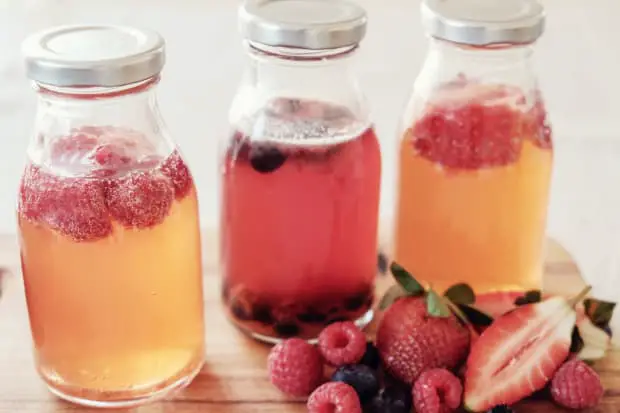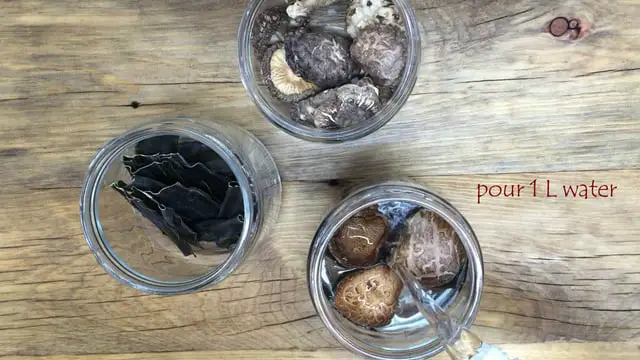7 Easy Ways to Know If Your Kombucha Is Authentic (and Why it Matters)
7 Easy Ways to Know If Your Kombucha Is Authentic (and Why it Matters)
True ‘booch is the best.

Step into your local supermarket, and you’ll likely see ten different kombucha brands on the shelf. But not all of these slightly effervescent, probiotic-rich beverages are created alike.
“As with any trendy wellness product, there is a large selection of kombucha brands which are not as healthy as they may seem,” explains Samantha Morrison, Health and Wellness expert for Glacier Wellness, a company dedicated to natural and sustainable health products. “Although a small amount of sugar is necessary for the fermentation process, many brands add enough sugar and fruit juices that their kombucha becomes just another sweetened soft drink.”
She also notes that many processors are cutting corners when it comes to traditional fermentation, leading to a dearth of the healthful probiotic bacteria that drives most fans to buy ‘booch in the first place.
“The probiotic bacteria contained in genuine kombucha can improve your digestion, boost your immunity, reduce inflammation in your gut, and even support your mental health!” explains Lisa Richards, certified nutritionist and the creator of the Candida Diet.
GT Dave, founder of GT’s Kombucha, notes furthermore that by opting for inauthentic kombucha, you’re not just missing out on critical benefits – you might also be imbibing some “not so great” things like vinegar concentrates or artificial flavorings.
Luckily, our experts are here to point you in the right direction to ensure that your ‘booch is the real deal.
1. Look for murk.
If your kombucha is crystal clear, consider opting for a different brand: a murky, almost stringy appearance is what you’re looking for.
“Real, authentic kombucha will be brewed with a SCOBY, which is a symbiotic collection of bacteria and yeast,” explains Richards. “Floating strands in your kombucha are a good sign that it’s been brewed correctly.”
2. Step away from shelf-stable.
Refrigerated kombuchas are the better choice if you want your brew to boast the right bacterial balance.
“Cooler temperatures are needed to keep the probiotic bacteria in your kombucha alive and healthy,” says Richards. “If kombucha spends too long at room temperature, these probiotic bacteria will start to die off, along with many of the benefits for your digestion.”
Refrigerated kombucha is more likely to be unpasteurized, unfortunately no longer the rule in the industry, according to Morrison. She notes that “ostensibly to avoid refrigerated shipping costs,” some brands are now pasteurizing their brews to make them shelf-stable, a big no-no if you ask Alexis Korman, co-founder of Big Easy Bucha.
“Pasteurizing kombucha can kill the naturally occurring probiotics and good bacteria that kombucha is known to contain, which is why it is cherished for gut health in the first place,” she says.
“If the kombucha is shelf stable (i.e. found in the center aisles of the grocery store instead of the refrigerator section), that’s a big red flag.”
GT Dave also recommends checking out the “enjoy by” date printed on top of the cap. This, he says, “should have a short window to reflect the fact that it is a raw, living food.”
3. Look for natural probiotics.
Probiotics develop naturally in kombucha, but some companies are adding more to their brews following the fermentation process, and this is a big no-no.
“Bacteria that participate in kombucha fermentation undoubtedly decrease in viable cell count after bottling and refrigeration,” explains Phil Calabrese, Quality Director at Rowdy Mermaid Kombucha. He notes that this has led some producers to add spore-forming bacteria, which survive pasteurization and are shelf-stable, to their kombucha.
“I wouldn’t label the addition of probiotics as inauthentic,” he says, “but would point out that it is not traditionally found in the fermentation.”
Jamba Dunn, Rowdy Mermaid CEO, adds that laboratory coagulans (spore-form probiotics that can withstand pasteurization) “are not in any kombucha that has been naturally made throughout its 2,000-year history.”
“Rowdy Mermaid Kombucha stays away from all such lab-raised spores,” he says, a sentiment echoed by Korman of Big Easy Bucha.
4. Look for a short-and-sweet ingredient list.
Kombucha should be made with simple, easy-to-pronounce ingredients: real tea (as opposed to tea flavors, extracts, or essences) and not much else.
“Anything more than water, sugar, tea, and culture is an unnecessary additive and should be taken into account,” says Morrison. “In addition to a probiotic mixture of yeast and sugar, keep an eye out for vitamin B, which is a natural byproduct of the fermentation process.”
“Any artificial flavors or extracts, or ingredient lists that contain Stevia, should be a huge red flag,” says Korman.
GT Dave also notes that kombucha itself should feature high on the ingredients list. Otherwise, he says, “this would mean the beverage consists primarily of water, not raw Kombucha.”
Whenever possible, adds Dunn, choose kombucha made with locally-sourced ingredients.
“Traditionally, kombucha would have been made with tea, herbs, roots, and mushrooms that were locally harvested,” he says. “Things have changed a lot in the world we’re in now where everything is done in mass and trying to choose as many locally-sourced or non-environmentally impactful ingredients as possible is also part of the authentic tradition of kombucha.”
5. Don’t spill the tea.
While for most, the very definition of kombucha is a product that is made with a tea base, some kombuchas, like the herbal blends from Rowdy Mermaid, are not. And this isn’t necessarily a bad thing.
While Richards cautions that “genuine kombucha will always be made with either black or green tea,” she also notes that “if your non-tea kombucha is still made with a SCOBY, you will still get many of the health benefits that come from real kombucha.”
“The probiotic bacteria are not dependent on the tea to survive or grow, so your non-tea kombucha can still have real benefits for your gut health and digestion.”
“The important thing,” says JP Franklin, founder of Mightybooch, “is that it’s naturally fermented with a symbiotic culture of bacteria and yeast and not pasteurized.”
Non-tea kombuchas like those from Rowdy Mermaid can also be caffeine-free: an added bonus for those who are sensitive to or avoiding the compound.
6. Don’t expect consistency.
Kombucha is alive, so even if you have a favorite brand, you can’t expect it to always taste exactly the same.
Korman notes that slight variation in flavor from batch to batch isn’t just “expected,” it’s “welcomed.”
In the case of Big Easy Bucha, she says, “It speaks to our commitment to small batch methods and to source as much fruit as possible from real Southern farmers.”
7. Do expect tang.
A true kombucha will make itself known at first sip.
“Once you’ve opened a bottle, the key indicator to identify a true kombucha is its signature tangy taste,” explains GT Dave, a natural byproduct of the fermentation process. “Any Kombucha that does not offer this noticeable tangy bite is inauthentic, including those crafted from concentrate.”
Do bear in mind that we’re living in a bit of a golden age of kombucha.
“There is much less poor-quality kombucha than there used to be,” says Richards. “Kombucha, and probiotic foods in general, are now much better understood and so consumers tend to be pickier. Most brands of kombucha now come with the SCOBY and are refrigerated.”
By continuing to demand more from our kombucha producers and distributors, we’ll be well on our way to ensuring that the only thing we have to choose between is flavors.
Related on Organic Authority
Can You Drink Kombucha Every Day?
Yasss! This 4-Ingredient Kombucha Recipe is Easy Homemade Fermented Goodness
Feds Crack Down on Kombucha Drinks Again, Industry Pushes for Clearer Regulations
[page_popup id=”1″]



